US Demands Iran Honor Commitment To UK To Furlough Detainee
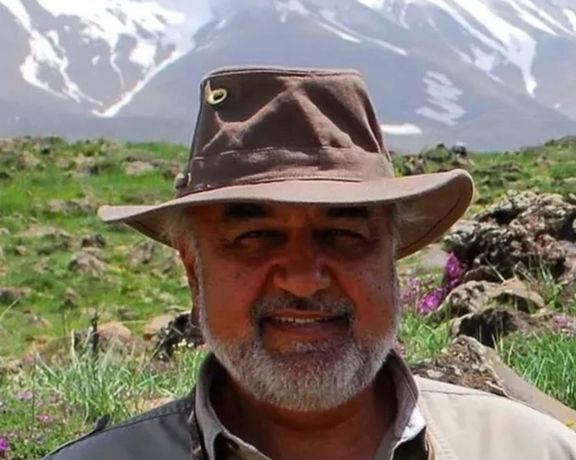
The US said Friday anything short of an immediate furlough of a dual citizen taken back to an Iranian prison, would be a violation of Tehran's commitments to the United Kingdom.

The US said Friday anything short of an immediate furlough of a dual citizen taken back to an Iranian prison, would be a violation of Tehran's commitments to the United Kingdom.
In a deal earlier this week that freed two British Iranian detainees, Tehran promised also to furlough environmentalist Morad Tahbaz, who holds both British and American citizenship.
Tahbaz's sister, Taraneh Tahbaz, in an interview with Reuters said her brother had been taken back to prison on Friday after being released on furlough on Wednesday.
Shortly afterwards, a spokesman for Britain's foreign ministry said it had been told by Iran that Tahbaz, 66, had been taken back to Evin prison “to fit an ankle bracelet” and that the British government hoped he would be allowed out in coming hours.
A State Department spokesperson, speaking on condition of anonymity, noted that Iran made a commitment to the United Kingdom to furlough Tahbaz.
"We are not a party to this arrangement but would join the UK in considering anything short of Morad’s immediate furlough a violation of Iran’s commitment. We are urgently consulting with the UK on appropriate responses," the spokesperson said.
"We continue to work night and day to secure the release of our wrongfully detained citizens, including US-UK citizen Morad Tahbaz," the spokesperson said.
Tahbaz was arrested in 2018 and sentenced to 10 years in prison for "assembly and collusion against Iran's national security" and working for the United States as a spy.
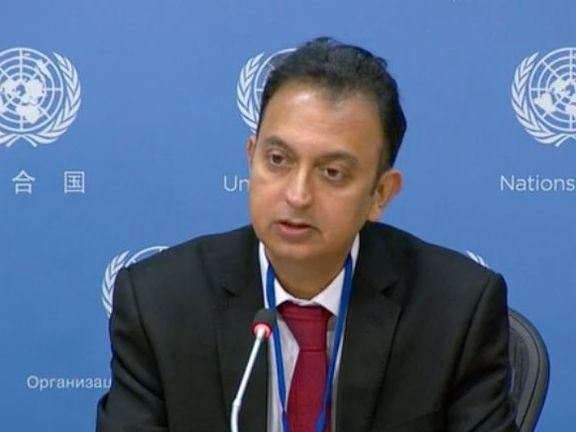
Iran's foreign ministry on Friday accused the UN Human Rights rapporteur of 'politicizing' the situation of human rights in Iran and issuing biased reports.
In a statement, ministry spokesman Saeed Khatibzadeh said the latest report of UN special rapporteur Javaid Rehman on the situation of human rights in Iran to the UN Human Rights Council was "full of one-sided and incorrect information and conclusions" and contained allegations based on misinformation received from "hostile sources".
In the report Rehman highlighted the situation of American, British, French, German, Austrian, and Swedish prisoners in Iran, several of whom were convicted by Revolutionary Courts on vague security charges after trials that did not meet international standards of due process.
The accused in such cases often cannot choose their defense attorneys. Trials take place behind closed doors, and duration of detentions before trial are arbitrary. International human rights organizations have documented numerous instances of violations.
Iran released two British-Iranian detainees on Wednesday after the payment of an old $530 debt to Iran but Iran's foreign minister, Hossein Amir-Abdollahian denied there was any connection between the payment and the release of the two detainees who spent several years in prison on charges of spying.
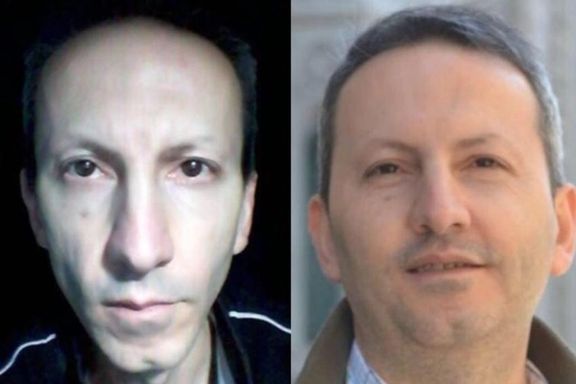
International organizations such as Human Rights Watch (HRW) and the UN Working Group on Arbitrary Detention have for years said Iran's security forces were targeting Iranian dual citizens and foreign nationals, charging them with cooperating with "hostile' states without revealing any evidence, and sentencing them after trials that violated their right to due process.”
According to Rehman's report, in 2021 Iran executed at least 280 individuals, including at least 10 women and three juvenile offenders who were convicted of crimes committed before they reached the age of 18.
Rehman, a professor at Brunel University, has not visited Iran since he was appointed in 2018, because Iran has banned UN and other human rights investigators from visiting the country.
“We condemn the application of double standards by Western countries and the instrumental use of the concept of human rights as well as the silence and inaction of countries that claim to be advocates of these rights” in the face of human rights violations by certain countries, Iran's President Ebrahim Raisi said Monday.
After Saudi Arabia’s execution of 81 prisoners in the largest mass execution by the kingdom in modern history over “terror-related offenses", Kazem Gharibabadi, the secretary of Iran’s High Council for Human Rights, also criticized Western countries for using human rights to put pressure on non-aligned countries but not their allies such as Saudi Arabia.
As in his previous quarterly reports, in his latest report to the forty-ninth session of the UN Human Rights Council Rehman urged Iran to immediately abolish the death penalty for all offences through legislation.
Pending abolition, he urged the authorities to impose an immediate moratorium on executions and commute all death sentences, amend legislation to prohibit the execution of persons who committed a crime while under the age of 18 years and for offences that do not amount to the most serious crimes under international human rights law.
He also urged protection of prisoners and detainees from all forms of torture and other cruel, inhuman, or degrading treatment or punishment and ensuring that confessions are not obtained through torture or ill-treatment, revise legislation to eliminate child marriage, and improve conditions in prisons.
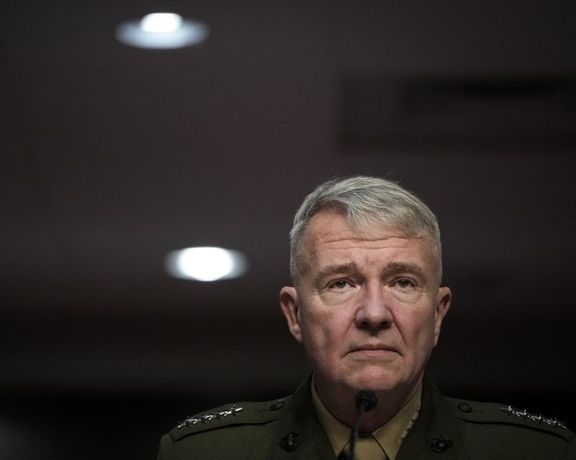
The outgoing US CENTCOM chief has slammed delays in weapons sales to allies in the Persian Gulf, calling for more US commitment to counter the Iranian threat.
General Kenneth McKenzie told a House Armed Services Committee Hearing on Middle East Security Challenges on Thursday that reducing the number of American troops and capabilities in the region contributed to the perceptionof a “wavering United States commitment to the security and stability”.
“The greatest single day-to-day threat to regional security and stability remains Iran, which challenges the US and its allies by pursuing regional hegemony, breaching its Joint Comprehensive Plan of Action (JCPOA) commitments, and posing a conventional threat to partner nations while facilitating and conducting coercive and malign activities”, he said.
McKenzie added, “Deterring Iran and its threat network depends on capabilities that provide a credible threat of a robust and timely response to Iranian aggression paired with flexible deterrent and response options that impose high costs on Iran, thereby altering its decision calculus.”
Describing the Houthis as the “least restrained and most destabilizing of all of Iran’s affiliates in the region”, McKenzie said they can escalate the crisis in the region “using whatever means the Iranians put at their disposal, even at the risk of inflicting mass civilian casualties and threatening American forces.”
He said, “Iranian-aligned militia groups are likely to continue sectarian criminal, and anti-US activities that destabilize Iraq.”
“Iran will continue to use Syrian (and likely Iraqi) territory as a critical hub and resupply route for maintaining its campaign against Israel”, McKenzie added.
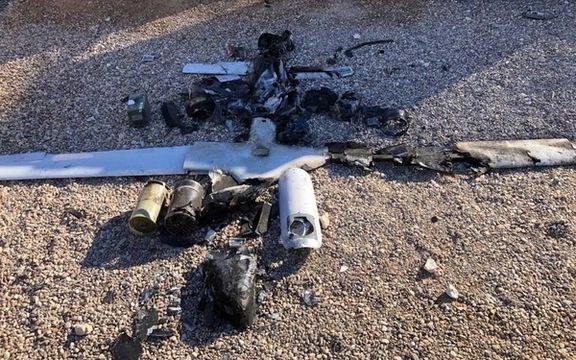
The Iraqi Security Media Cell said Thursday that four Katyusha rockets had struck Iraq’s largest military airbase 90km north of Baghdad in Salahuddin province.
Colonel Mohammed al-Bazi of the provincial police said the attack on Balad had caused no casualties but that three of the rockets had hit one of the base’s buildings, leaving minor damage, while the fourth landed in an open area. The base hosts Iraqi F-16 jets, while United States security contactors have reportedly left what was once the major hub for in-coming US munitions.
The Iraqi Security Media Cell, which calls itself a counter to the propaganda of Daesh, the Islamic state group, claimed the rockets were launched from Khalis district, some 20-25km away, in neighboring Diyala province.
The cell blamed this “cowardly terrorist act” on “gangs that do not want stability for Iraq” who it said would be “put behind bars…under the judgment of the law.”
No group has claimed responsibility. The Kurdish news agency Rudaw notedthat “similar attacks on international targets in Iraq are blamed on Iran-backed Iraqi militias who want to force American forces to withdraw from the country.” Rudaw said such attacks “increased after the US assassinated Iranian General Qasem Soleimani and Iraqi militia commander Abu Mahdi al-Muhandis in Baghdad in January 2020.”
On Sunday, Iran fired 12 ballistic missiles at Erbil, northern Iraq, after an Israeli airstrike in Syria killed two Iranian soldiers. A villa, Iran alleged was used by Israeli intelligence, was damaged but there were no casualties.

An American Navy veteran who was jailed in Iran for nearly two years has sued the Islamic Republic claiming that he was kidnapped, held hostage, and tortured.
In his lawsuit filed in federal court in Washington, DC, Michael White alleged that he suffered “prolonged and continuous” torture in Iran to pressure him to falsely confess that he was a spy for the US government, AP reported on Friday.
In a 156-page manuscript that he wrote behind bars, he described in detail how he was beaten and punched, whipped on his feet, and deprived of food and drink.
In a 31-page complaint, the lawsuit said he was lured to travel to Iran in the summer of 2018 by a woman he considered his girlfriend, then he was kidnapped by Iranian agents and put in prison.
He was charged with insulting the Supreme Leader Ali Khamenei and cooperating with the US government against Iran and sentenced to 10 years in prison without a trial. The lawsuit says the charges were fabricated.
If Iran does not respond to the allegations, a judge could enter a default judgment on White’s behalf, enabling him to collect damages from a fund set up for victims of acts of state-sponsored terrorism.
He was released in June 2020 after 683 days of incarceration.
Although US and Iranian officials repeatedly denied claims about a prisoner exchange, just a day before White’s release, an Iranian professor who was arrested in the US for violating sanctions on Iran was acquitted and returned to Iran.
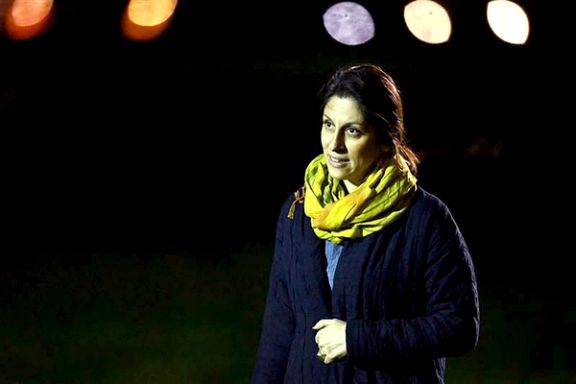
While London paid Tehran $530 million to free two British dual nationals, it is not clear if the cash is at Iran’s disposal, or has strings attached to it.
The Iranian Foreign Ministry Spokesman Saeed Khatibzadeh insisted that the funds have been put at the disposal of Iran and Tehran has full control of it. "It is only Iran and not any other party including the UK that can determine how the money is going to be spent."
The British side has offered a different account about the payment. According to a statement by the British Foreign Secretary Liz Truss, "The IMS debt has been settled in full compliance with UK and international sanctions and all legal obligations. These funds will be ring-fenced solely for the purchase of humanitarian goods."
The Guardian had earlier reported that that the sum will be spent under the supervision of Switzerland.
But Russ also said: "Last December I met Omani Foreign Minister Badr to secure Oman’s diplomatic assistance. We are grateful to our friends in Oman for their support in securing the return of our nationals."
Meanwhile, other sources in London told Iran International TV that the sum is at the disposal of the Central Bank of Oman as a credit line and will be paid for purchases made by Iran and verified as being spent for humanitarian needs.
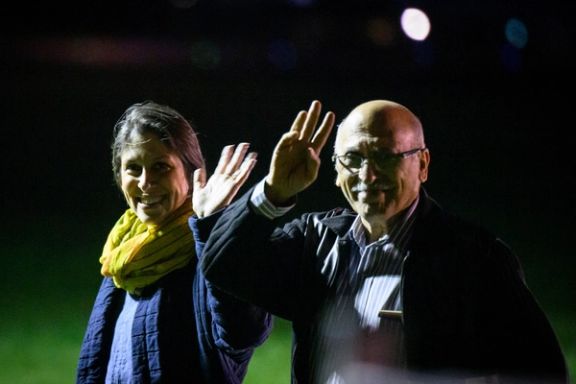
Yet another source told the IITV, that the US National Security Adviser Jake Sullivan has played a constructive role in facilitating the payment for humanitarian reasons while Iran is being sanctioned by the United States.
The release of dual nationals Nazanin Zaghari-Ratcliffe and Anoosheh Ashoori has been hotly debated in Iran, with hardliner media claiming victory for forcing the UK to pay and their opponents questioning the detention of the dual nationals.
IRGC-linked Fars and Tasnim news agencies as well as other conservative media outlets including Mehr news agency reported on Wednesday that the prisoners were released only after the United Kingdom made the payment to Iran. But Foreign Minister Hossein Amir-Abdolahian has said that that there was no link between the release of the detainees and the money paid.
Amir-Abdollahian also reiterated in an interview with IRNA that money changed hands between the UK and Iran a few days prior to the prisoners' release and although the payment and the release of prisoners took place within a short period, the two events were not connected.
On Thursday, hardline daily Kayhan ruled out the Iranian Foreign Minister's statement and wrote that the UK was "forced" to pay back its $530 million debt.
The official news agency IRNA insisted that the release of the two prisoners was based on humanitarian reasons and a decision made just before the Iranian New Year (Nowruz) and the birthday of the 12th Shiite Imam.
However, former lawmaker Ali Motahari wrote in a tweet that "If Iranian officials are telling the truth about releasing Zaghari-Ratcliffe for humanitarian reasons, and her imprisonment and release had nothing to do with the UK's debt to Iran, they should explain what she had done to deserve spending 6 years in jail in Tehran."
Some Iranian news outlets including Etemad Online reported that a third British Iranian prisoner Morad Tahbaz was also granted furlough and that he is out of jail and with his family in Tehran. The furlough was reportedly part of the deal that led to the release of the other two prisoners. Why the UK did not demand full freedom for all detainees, having paid hundreds of million of dollars, is not clear.